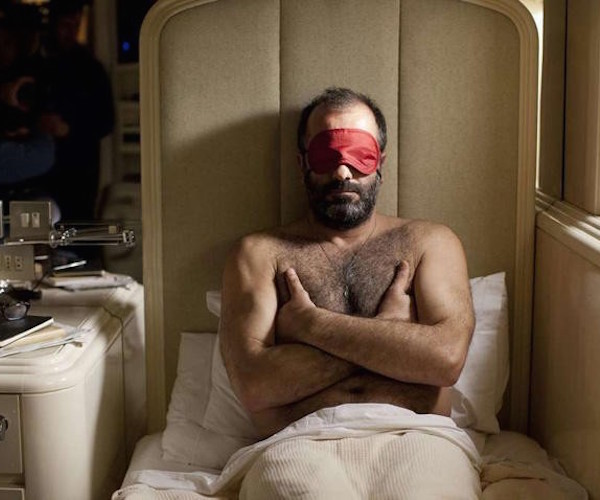Film Review: “Chevalier” — Memorable Macho Madness
Chevalier is a hilarious but unapologetic glimpse into bad behavior among men who fancy themselves among society’s elite.
Chevalier, directed by Athina Rachel Tsangari. At the Kendall Square Cinema, Cambridge, MA. (Tsangari will attend the Sunday, May 29 screening/Q&A at 7 p.m.)

A scene from “Chevalier” screening at the Kendall Square Cinema.
By Peg Aloi
Director Athina Rachel Tsangari asks an elemental question in this movie: is there anything men won’t compete over? There may be a powerful social metaphor at work here, but there were also times when I just wanted to bask in the film’s brilliant moments of black comedy, wallow in its sardonic absurdity.
The opening shot of this Greek film shows a huge rock facing a cliff on the shore of the ocean. Gradually, small figures emerge from the waves. The divers return to their fishing vessel and almost immediately the conversation turns to their yields that day. These are not working-class fisherman; the elaborate accoutrements of their yacht (a mechanized voice announces the weather conditions and diving schedules) and expensive wetsuits suggests a luxury tour, we also learn they’re on the Aegean Sea. There is a doctor among them. The men seem to spend a fair part of their time out of the water working out on rowing machines. At night they read, or, in the case of the vain, good-looking Christos (Sakis Rouvas), engage in naughty Skype conversations with women. One man has brought his brother, who is overweight and somewhat socially awkward: the guy wants to be a diver. His brother doesn’t think he has what it takes, though he is also indulging him, trying to bolster his ego.
Remember that game called Botticelli? It’s from the days long before Trivial Pursuit or Cards Against Humanity, before binge watching and X-Box, before we all started hanging out with friends while looking at our smartphones non-stop. You sat around with your pals, and one of you would answer questions about the person you were thinking of, along the lines of “If this person were a color, what color would they be?” It was an effective strategy for encouraging flirtation or petty passive aggression. When these divers play the game, there are disagreements over their opinions of one another. One of them suggests that they engage in a competition to determine which of them is the ”Best in General.” They establish some basic rules and agree to take copious notes of their findings, awarding points for various categories. The winner will receive the chevalier: a small gold signet ring worn on the pinky, a shiny emblem of male adolescent achievement.
And here begins the heart of this film, a rather ruthless but often amusing contest that divulges these men’s worst narcissistic impulses. When the sea turn stormy, we wonder if this will become a gritty survival narrative. But Tsangari’s film is more ambitious in its storytelling: the suspense comes from wondering what picayunish category will become their next arena of competition. If you’ve already guessed that penis size enters into the fracas, then you’ve got the idea. Nothing is off the table: receding hairlines, dyspepsia, forgotten song lyrics, all become potential sources of shame. Things escalate, angry words are uttered, and it’s hard to say if the men are more ashamed of their behavior or upset that they’re losing points. When the boat docks in Athens, the men remain aboard, relentlessly measuring one another (sometimes quite literally).
I suppose it takes a woman to make a film like this (which won the Best Film Award at the London Film Festival), but I don’t think the point is to merely satirize male braggadoccio. The obsession with physical attributes and appearance is also clearly a comment on the competitive nature of women, too, and the ways that individual identity can become bound up in our efforts to anticipate (and cater to) the perceived judgment of others. I enjoyed this film’s unnerving intimacy and subtle hilarity, its fine-tuned performances, its unexpected use of music, and its straightforward tone. Chevalier offers an unapologetic glimpse into varieties of bad behavior among men who fancy themselves among society’s elite. The film’s large scale imagery also suggests a larger metaphor at work here: since Greece is a nation unusually open to receiving European refugees, perhaps there is a hint of have versus have-not in the minutiae of the men’s obsessions. First world problems look increasingly trivial when held up next to an immigration crisis. In today’s increasingly narcissistic world, Chevalier serves as a cautionary fable that (thoughtfully) gets us laughing at ourselves.
Peg Aloi is a former film critic for The Boston Phoenix. She has taught film studies for a number of years at Emerson College and is currently teaching media studies at SUNY New Paltz. Her reviews have appeared in Art New England and Cinefantastique Online, and she writes a media blog for Patheos.com called The Witching Hour.
